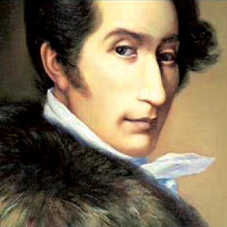
Bio
Carl Maria von Weber (1786 –1826) was a german composer, conductor, pianist, guitarist and critic, and was one of the first significant composers of the Romantic school. A brilliant pianist himself, Weber composed four sonatas, two concertos and a concert piece, which influenced composers such as Chopin, Liszt and Mendelssohn. Weber's compositions for clarinet, bassoon, and horn occupy an important place in the musical repertoire. Weber's contribution to vocal and choral music is also significant. His body of Catholic religious music was highly popular in 19th-century Germany. Weber's orchestration has also been highly praised and emulated by later generations of composers – Berlioz referred to him several times in his Treatise on Instrumentation while Debussy remarked that the sound of the Weber orchestra was obtained through the scrutiny of the soul of each instrument. His operas influenced the work of later opera composers, especially in Germany. Weber also wrote music journalism and was interested in folksong, and learned lithography to engrave his own works.
 Kontakt
Kontakt Warenkorb
Warenkorb Meine Favoriten
Meine Favoriten Mein Konto
Mein Konto






